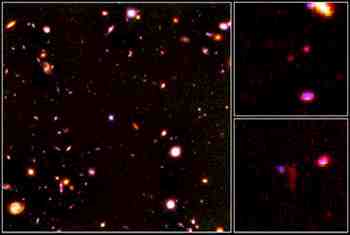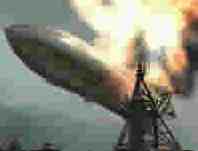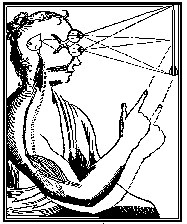 Can
we see things that aren't there?
Can
we see things that aren't there?|
|
Introduction to Philosophy |
 Can
we see things that aren't there?
Can
we see things that aren't there?"The two images on the right represent close-up views of objects that may be over 12 billion light-years away, the farthest galaxies ever seen."
Light from some of these galaxies took some 12 billion years to reach the camera. Galaxies don't necessarily last that long.
So at the time we see the photograph it is probably no longer there.
 There's
no problem with looking at a photograph of something that is no longer there
. Here for example is a picture of the Hindenberg airship before it disintegrated.
There's
no problem with looking at a photograph of something that is no longer there
. Here for example is a picture of the Hindenberg airship before it disintegrated.
But think of the astronomers looking directly through the telescope at truly distant objects: they could well be looking at something that doesn't any longer exist.
Is that possible?
Can you see things that don't exist?
People claim to see ghosts I know, but they think that the ghost is there to be seen. And they have hallucinations: but then they only think they see something, they don't see something that doesn't exist.
But here we have a case of seeing something which doesn't exist.
The astronomical case is extreme, but it makes a point, it is argued, that applies to perception generally. There is always a gap, a gap in time between stimulation journeying to and through our sense organs and nervous system and our having the actual perceptual experience.
Summary: In perception we are directly aware not of an object in the world but of representations in our minds.
 Here
is a diagram Descartes published. It shows a view of perception, dramatically
new in Descartes' day, which expresses the Modern understanding of perception.
Here
is a diagram Descartes published. It shows a view of perception, dramatically
new in Descartes' day, which expresses the Modern understanding of perception.
Rays of light fall on an object. The object reflects the light with the result that sometimes the deflected rays fall on an eye. If the eye is open and some rays pass through the pupil, they will be focussed by the lens and form an image on the retina. Receptors in the retina register the pattern of light, and the information is passed back into the brain. There something we don't yet understand happens with the result that we have a visual experience. We speak of 'seeing' the object.
That is how we speak.
But the account of seeing that I have just given makes what we say appear misleading. We are not actually seeing the object at all, you might say. What we are seeing is an image of the object. What we are actually aware of is a representation of the object in our brain.
The representational theory taking shape in the thought of John Locke. Internet Encyclopeadia Intro to John Locke |
You will find this theory set out by John Locke in the 17th Century.
This passage is in the Reader:
8. Whatsoever the mind perceives in itself, or is the immediate object of perception, thought, or understanding, that I call idea; and the power to produce any idea in our mind, I call quality of the subject wherein that power is. Thus a snowball having the power to produce in us the ideas of white, cold, and round,- the power to produce those ideas in us, as they are in the snowball, I call qualities; and as they are sensations or perceptions in our understandings, I call them ideas..."
(Locke, An Essay Concerning Human Understanding, Bk II, Chapter VIII paragraph 8, with subtitles removed; Reader, page 209; e-text)
You need to distinguish two things, says Locke. The ideas we form of objects in our minds and what causes them.
Summary: Our ideas are not always copies of what is there in the external world.
Locke makes this distinction between idea as the perception in one's mind of a physical object and quality as the feature of the physical object which causes the perception in order to make clear how he differs from his predecessors.
He doesn't think our perception is necessarily any kind of 'copy' of the thing perceived.
Others had accepted the assumption that when you look at an animal, for example, you have in your mind, not the thing itself, but a copy of the thing itself.
So if I am in the woods and see a badger, I have in my mind not the badger itself exactly but something that has the shape of a badger the size of a badger and the colour of a badger. If I hear it bark, I have actually in my mind not the barking badger itself but something like the barking badger - a mental something that is simliar to the barking badger. I have something in my mind something which is like the badger itself and is a fully-featured copy of the badger.
Locke says it is usually believed that in perception, the ideas that are formed 'are exactly the images and resemblances of something inherent' in whatever it is you are perceiving. (Locke, Essay, Bk II, Chapter VIII para 7; Reader, page 209; quote appears also above)
Locke's point is that this is wrong.
In perception he says you do not form copies of the thing perceived. Some aspects of the thing perceived are copied in the idea that you form of it, but some aren't.
I wonder if you agree?
When you look at something and form an idea of it, do you think that your idea copies all the features of the thing you are looking at?
If your ideas always were faithful copies of all the features of the things you perceived in the world, you would build up inside your mind a full and accurate picture of the world as it was independent of you the perceiver.
Perhaps this is what you are tempted to think.
A baby perhaps doesn't have a very adequate picture of the world, beginning perhaps with the single belief that the world is has just two things in it, mummy and not-mummy, teat and not-teat; or perhaps me and not-me.
Only as the little lovely gains in experience, grows ever richer in its perceptions, does a full picture of the world build up inside her/his little mind. But in the end the picture is reasonably complete, so that the picture inside the head mirrors in all major features and in considerable detail the world as it really is: as it is independently of the child's, or anybody's, perception of it.
Prompt: Who I wonder is broadly sympathetic with this understanding - an understanding of the relationship between our perception of the world and the way the world actually is? Find out what your neighbour thinks and we will take a vote.
What did Locke think? He thought the picture we form of the world is radically different from the way the world really is.
You may have heard of the tree failing in the forest with no-one to hear it, but I'm afraid I have to remind you of it...
It's very simple.
You have to think of a forest somewhere very remote, say in the Northern reaches of Finland. A forest with nobody living there, nobody vacationing there, nobody staying in the sauna hut, nobody yoyoing between sauna and lake. And no creatures there either. No reindeer, no wolves, not even an itinerant badger. Absolutely no animal life for hundreds of miles.
Fortunately, this is of course extremely unrealistic. A bit more pollution, a few more Chernobyls across the border in Russia and we may get there, but at the moment I am having to ask you to use your imaginations. Imagine no animal, no sentient life, for hundreds of miles.
All quiet. Eerily quiet.
Then, getting old, getting bored, getting rotten, one of the old great trees in the heart of the forest suddenly loses its will to live. A crack and it begins to keel over. There is now a gathering crescendo of noise, beginning as small twigs snap, growing very quickly as whole boughs break off, the tree arcing downwards, until with an almighty roar the huge tree crashing and crunching measures its great length along the forest floor.
Quiet begins to creep around again.
You get the picture.
A tremendous roar - but no one, and no creature, no sentient being to hear it.
So is there a roar?
No-one will know there is a roar, of course, we have made that clear. No-one will hear it. But still - there will have been a roar, you may say.
As the tree crashes, sound vibrations will have been initiated, no question. So that if for example you had left a microphone in the area with a tape recorder, you would have made a recording on tape. The vibrations caused by the crash would have reached the microphone impacted on its membrane, and that would have been converted into electrical impulses which would have registered on the tape.
But even if the tape-recorder had been there, would there have been that tremendous roar I have been talking about? There would have been tremendous vibrations, maybe, but tremendous vibrations in the air are not in themselves a tremendous roar are they? Wouldn't tremendous vibrations have to hit the ear before they get turned into a tremendous roar?
If so, Locke has his point that there aren't any tremendous roars in the universe as it really is - only tremendous vibrations, vibrations which cause us to experience roars if our ears are around to pick them up, but vibrations which if nothing sentient is there to pick them up will propagate with vigour and violence - and absolute silence.
Prompt: What do you think? If there is no-one and nothing there to hear it, does the tree fall in silence?
Is there anything else like sound? If the argument about the falling tree is valid, the universe as it really is is silent. Are there any other qualities of our experience which are like that do you think?
Prompt: Which of the qualities in the table are features of the tree that it has quite independently of any sentient being observing it?
| Quality | The tree does not have this quality independently of any sentient being observing it: | The tree has this quality independently of any sentient being observing it: | Question not clear enough to answer |
| it has a shape | |||
| it has a weight | |||
| it has mass |
|||
| it occupies space | |||
| its bark is rough to the touch | |||
| its leaves are green | |||
| it makes a creaking noise when the wind is up | |||
| it stays rooted to the spot - doesn't move about |
The thesis we have been exploring is this: in perception you do not form copies of the thing perceived. Some aspects of the thing perceived are copied in the idea that you form of it, but some aren't.
It is perhaps best seen as a point about the scientific world view that Locke was helping to form. A world view that 'privileges' some features of the world at the expense of others - ? It would make the world out to be, in itself, a severe and forbidding construction: just atoms moving about, with nothing but size, shape, solidity and motion. Most of the things which give human beings pleasure are not there in reality, but somehow constructed by human beings themselves: colours, smells, sounds, tastes. (Though I have to agree shape and motion can in context be very important.)
 |
|
This is a much duller picture if the colours are reduced (as my computer thinks of it, anyhow) to two. How much duller if they are eliminated altogether? |
But now I want to think about just those perceptions that are copied from the world: eg our perception of a thing's shape. We see a tree having a particular shape, and we think of the shape as actually there, an objective feature of the tree as it exists independently of us.
There is a fundamental philosophical problems even with these perceptions. Earlier I reminded you that astronomers sometimes report observations on distant objects which opens up the possibility, probability even, that what we are observing on the earth now has actually already passed out of existence.
I also said that when you thought about it this appeared to be just an extreme case of something that applies to perception generally.
Even with a nearby object it takes time - a very tiny amount of time, but time - for light to traverse the gap between object and the lens of your eye. And what happens there is the beginning of a highly complex sequence of neurophysiological events, with signals being passed along nerves and neural networks in the brain subjecting those neural impulses to complicated analysis and evaluation before I experience seeing the object. All this processing takes very little time indeed - but it does take time.
With the distant object we might legitimately worry that it might have passed out of existence since the light rays that have now arrived on our retinas, say, left on their million-year journey. Suppose in fact we have reason to believe that the distant galaxy we appear to have under observation has since imploded or evaporated or exploded or turned into a black hole or whatever happens to galaxies when they cease to be. We might ask ourselves in this case: well, if the object is actually not there any more, what exactly are we seeing? We can't be seeing the object - it is no longer there to be seen.
But though the distances are immensely different doesn't the same possibility, and difficulty, arise with all the ordinary things around us?
We have the experience of seeing them a short time after the light has left them.
Might they not have passed out of existence too between the moment when light is reflected by them and the moment when it impacts on my retina?
Maybe you will say that now the chances are completely different and that it is hugely unlikely that the object will pass out of existence in the micro seconds or whatever the light from them takes to reach us and the signals it stimulates get processed.
Does that matter? Perhaps it's the fact of the time-gap that does the damage - doesn't matter how small. If there is any time elapsing at all between light leaving the object and our having the experience of 'seeing' the object, maybe it follows that we can't actually be seeing the object at all?
Do you think?
Prompt: Do you agree that the time-lapse entailed by the scientific (causal) theory of perception means that we can't be actually seeing directly the object we are looking at?
Take a slightly different consideration.
If we all take a look at the same thing, a book, say, we are likely to see slightly or not-so-slightly different colours. Depending on how the light strikes it, it may seem green to some of us, blue to others, bluey-green to others, perhaps white to others and even black to some others: and so on. I don't mean we would see the same colour but describe it in different ways. I mean we would see different colours because of our different angles. The light that comes to one person's eyes will have hit the object at a different angle from the light that gets to somebody else, and for that reason it may carry a different colour.
Two possible implications.
One is that the thing doesn't have a colour objectively. We've discussed this.
The other is that what we are actually seeing can't be the thing itself. I'm seeing something. You are seeing something. But I am seeing something blue and you are seeing something green.
What is this thing that you are seeing? This thing that isn't the same as the thing I am seeing, and isn't the object either?
It is, says Bertrand Russell, a sense-datum.
"Let us give the name of 'sense-data' to the things that are immediately known in sensation: such things as colours, sounds, smells, hardnesses, roughnesses, and so on." Russell, Problems of Philosophy, Chapter 1.
A "radical, active, liberal intellectual, beginning by standing as a suffragist candidate for [UK] Parliament." (Blackburn's Dictionary)
"Denied employment by the City university of New York, on the grounds that his works were 'lecherous, libidinous, lustful, venerous, erotomaniac, aphrodisiac, irreverent, narrow-minded, untruthful, and bereft of moral fiber'. (ibid)
Principia Mathematica, with Alfred North Whitehead, 1910-13.
Problems of Philosophy, Oxford, 1912. e-text thanks to Andrew Chucky
He thinks the same argument applies to the other senses. Different people, and the same person on different occasions, will get different 'sensations' when they inspect a given object, dependent on the circumstances of the observation. For example, what light is falling on it, whether we have a cold, what angle we are looking at it at, whether we've got tinnatus and so on.
The colour and angle of light falling on an object affects the colour sensation it will give rise to in us.
If we have a bad cold we probably won't be able to smell it as we perhaps do smell it when we are in perfect health.
If we've got tinnatus, the sound we hear when the thing is knocked will sound to us different from the sound we hear when we are well.
Prompt:what is the most striking sense shift expeeinced by members of your group?
So he wants to say about the other senses what he says about our perception of colour, that what we actually sense in observation is not the object itself but sense-data. He means "such things as colours, sounds, smells, hardnesses, roughnesses, and so on". Problems of Philosophy, Chapter 1.
He thinks that we can and do make inferences from these sense data, use them for example to build up a picture of the object we are observing. But we are not directly experiencing that object. We are directly experiencing sense-data.
"...[W]henever we see a colour, we have a sensation of the colour ... The colour is that of which we are immediately aware..." Problems of Philosophy, Chapter 1.
This is tremendously significant for our understanding of ourselves and the knowledge of which we are capable, because we get so much of our knowledge of the world through our senses. (Many people think that we get all of our knowledge through our senses, but some others think we have have another window onto reality, which they identify with our power of reason.)
If the sense-datum theory is right, all the knowledge which we think of as drawn from observation in fact comes from our experience of sense-data. Sense-data become the foundation of all our observational knowledge.
The picture that is being drawn by Russell and other representational theorists seems to be this. Stimulation falls on our sense-organs, and the signals that are generated as a result are processed by the brain. At some point we sense 'sense-data'. We become aware of blue, roughness, sweetness of taste, middle C, whatever.
Where does the original stimulation which starts the train of neurophysiological and ultimately mental change come from? The picture suggests: from objects in the world.
But do they?
Is it true that the stimulation falling on our sense organs comes from objects in the world?
How can we check up?
Some philosophers reply to this: we can't. There is no way.
If all observation turns out to be based on our experience of sense-data we just don't have an observational way of finding out where the stimulation comes from.
The sense datum theory casts doubt on the existence of the world of objects.
Some thinkers say: the existence of sense data give us reason to think there is an external world. John Locke thinks this.
Some say: we somehow construct our self-placement in an external world out of sense data. Sense data are all we have.
Prompt: What do you think? Which of these - or neither?
Summary
So thinking about perception gives us reason for thinking
(a) the world is not how it appears
(b) the world as it appears is an illusion
Dark City, Daniel Scraber, 1998
This is one of the many I had missed, until one of your predecessors put me onto it, and very glad I am that he did.
It's a lovely dark film noir, with Kiefer Sutherland and others, a bunch of aliens with a group mind I think (maybe not a bunch but one alien with lots of bodies), a city which said group mind can reconfigure as it wills during the midnight hour, a city that they make to look like the old haunts of the hero, who here searches for the beach where long ago he met his love, and who finds nothing but a brick wall behind which is - outer space. Perception doesn't seem too reliable for this guy - I guess that's my excuse for choosing this clip, but really it's a taster, or reminder, of a film full of philosophical speculation, which is not The Matrix.
END
Distant galaxies picture produced by the Hubble telescope, thanks to Rodger I. Thompson (University of Arizona) and NASA
Hindenberg pic thanks to Gary Turner's Weblog